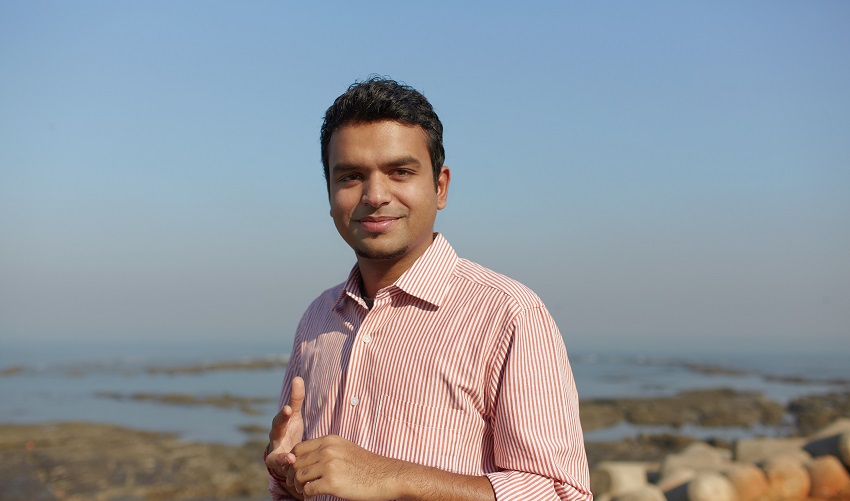Ameya Upadhyay knows all about what it is like to live in a lower-income area, and how opportunities can change lives.
“My parents grew up in a remote village in India in very humble households. I have experienced firsthand what “lower economic strata” really means, and how even a sliver of opportunity can transform lives, as it did for my parents when they were provided free education by state-run schools,” he said.
“Through education, they were able to get better jobs and propel the family upward. Through my work, I hope to help bring this same kind of opportunity to people, so they can realise their potential. From that point of view, my work is very personal and gives me the meaning I seek in life.”
After a stint at Bain & Company as a consultant, Upadhyay joined impact investment firm Omidyar Network in 2012, where he is now investment principal at the Financial Inclusion initiative. Launched by eBay founder Pierre Omidyar, the firm has become one of the biggest impact initiatives in the world.
“When eBay went public in 1998, Pierre Omidyar found himself wealthy beyond what he ever expected. Almost immediately he started a traditional grant-based, philanthropic approach and set up a foundation, but very quickly became frustrated with the limitations of this model,” Upadhyay said.
“Foundations do not take as much advantage as they can of the power of business and markets. His eBay experience showed him that businesses can be a driver of social impact. He looked conversely at the non-profit sector and saw how difficult it is to scale impact without sustainable revenue models, so he decided not to be constrained by structure and designed a hybrid entity to give flexibility to do whatever fits the bill.”
That entity is Omidyar Network, which adopts a “problem first, tool second” approach.
“Investment professionals like me treat grant and investment dollars equally and decide which vehicle to use based on what would create the most impact,” Upadhyay said.
Since its inception in 2004 up to the end of the first quarter of 2018, Omidyar Network has deployed more than US$1.3 billion globally – US$619 million invested in for-profit companies and US$684 million in grants to non-profit organisations.
Nearly US$275 million, was focused in advancing financial inclusion, the space that is Upadhyay’s concern. He focuses on investments in organisations that create economic opportunity for individuals to improve their lives across Africa and Myanmar.
“Financial inclusion is critical to economic and social development. As more people are able to better manage their money, they create a future of greater possibility for themselves, their families, and their communities,” he said.
“About 13 per cent of our financial inclusion investments so far – nearly US$40 million – have been deployed in support of African entrepreneurs tackling financial health and inclusion issues. We are early-stage, impact investors and, because we have only one funder, our capital is patient.”
So when Upadhyay and his team look at investments, the total value creation of a company is comprised of financial returns, social impact, and its effect on the sector as a whole.
“For our portfolio companies, this translates into valuing financial and impact returns equally and allowing longer time frames for exits – we understand that solving the world’s most complex problems takes time and that building an impactful business is a journey,” he said.
Omidyar’s financial inclusion investments in Africa include Flutterwave, Lidya and Pula, with Upadhyay saying the company’s natural next step is to turn its focus to improving household financial outcomes worldwide.
“Newly opened accounts can serve as an on-ramp to a broader range of affordable, convenient, and relevant financial services that address people’s unique context, and help improve day-to-day cash management, increase resilience, and position them to better capture and seize long-term opportunities. We will continue to focus our investments in entrepreneurs working to advance these areas,” he said.
Upadhyay thinks the technology space in Africa is “moving towards a step change”.
“There are massive variations across the continent; however, in many markets, we are seeing technology powering services that simply were not feasible a few years ago,” he said.
“Further, without exception, we come across incredibly able and motivated entrepreneurs working very hard to solve seemingly intractable problems, such as gaps in infrastructure and shortage of talent. There is a growing consensus among entrepreneurs that most inefficiencies need to and can be addressed by nimble startups.”0
Additionally, he said, the tech space holds promise for scalable solutions that can more readily serve dispersed and sparsely populated regions across Afr0ica. However, the operating environment for African startups is far more challenging than their counterparts in more mature markets.
“Hiring and retaining mid- to senior-level talent is a massive challenge. Of course, such talent exists, but given that the startup ecosystems are not well developed, many professionals do not view working in a startup as a viable career path. We are seeing this trend slowly change,” Upadhyay said.
“Shortage of enablers such as incubators, seed funders and mentors, particularly in the early stages, also prevent great ideas from becoming successful businesses.”
Meanwhile, several startups may need to develop solutions for gaps in infrastructure required for their core offerings to succeed.
“For example, a startup selling physical goods to consumers may have to develop logistics capabilities to do so. In developed markets, this would be a simple outsourced contract,” said Upadhyay.
Despite these lingering challenges, investor interest in Africa is growing.
“Disrupt Africa announced 2017 as a record year for African tech startup investments. A few notable sources published similar observations for 2017,” Upadhyay said.
“We are also seeing a growth in co-working spaces and targeted tech ecosystem development programs and initiatives funded by some of the largest global tech companies in the hopes of building a healthy investment pipeline.”


